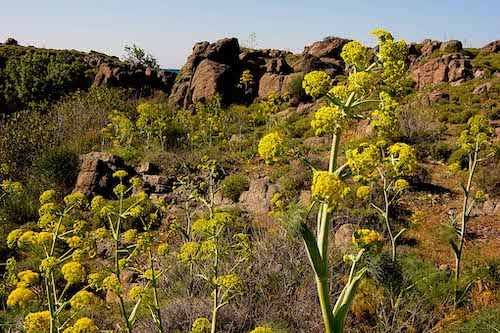(Giant fennel; photo: Jan van Lent)
The island is into its spring transition: borders, meadows, even forests surprise with colourful fields of flowers: white with daisies, fields blue with lupine, red with anemones and with the still to come poppies, yellow with mustard seeds or sourgrass. This light yellow Oxalis pes-caprae however is no local plant, but has secretly flown in all the way from South Africa. With its little underground bulbs it is difficult to get rid of and they’re taking over more and more fields in Lesvos. Their clover-like leaves contain twice as much vitamin C as a lemon does, but due to its toxic oxalic you’d best not overindulge yourself with them. Just use its acid taste to season a salad or a meat stew. There is no reason to let this aggressive plant take over your garden. However, they are not the only unreliable plants who like to travel or conquer land.
Orchids for example also like to migrate. On Lesvos they slowly move from the warm south to the cooler north. Although they do not move in big masses and are of no threat to other flowers. They just quietly and in unseen ways settle into their new habitats.
You can find the huge and graceful asphodels (Asphodelus aestivus) all over the island, but this year they seem, just like the combative Oxalis, in the mood to conquer as much land as possible. They push and bully until an entire field can be covered with pink-white clouds full of asphodels. Such a beautiful sight.
In Italy they use asphodel leaves to keep a cheese fresh: when the leaves fade, the cheese also has gone bad. On Sicily they collect asphodel honey. But in Greece asphodels are connected with the scent of death. They smell awful and are the flowers, according to mythology, that decorate the Greek afterworld, Elyseum. Homer wrote about death living between the asphodels. So these days parts of Lesvos look like the Asphodel Meadows from Hades.
There is another plant that marches from the south and west towards the north of Lesvos: the giant fennel (Ferula communis). It is an impressive, gigantic member of the umbellifer family, with stems as thick as a young tree with small yellow flowers. This mediterranean whopper, that can grow as tall as three to four meters, is a plant of fire. It was Prometheus who stole the fire from the Olympian Gods to give it to the people. Prometheus put some sparks from the forge of the god’s blacksmith, Hephaestus, in the hollow stem of a giant fennel, where the marrow can keep a flame burning for a long time. Without him or the giant fennel we never would have lived so comfortably.
The giant fennel also is at the origin of the Olympic fire. It is thought that around the times of the first games, hundreds of years BC, Greek athletes ran around with flaming torches of giant fennel, to announce the Games. And to impose an armistice, whenever there was a war going on. In those times they did stop fighting, unlike nowadays, Olympic Games or not, they will not stop a war for the Games. The fennel torch however did inspire the International Olympic Committee: the Olympic flame returned in 1928 to the Games (that year held in Amsterdam). Since then hundreds of athletes have brought the Olympic fire to all corners of the world.
The giant fennel also served as a walking stick for Dionysus and his followers, the so-called Thyrsus. Often they decorated the staffs with a pine corn, making it a phallus symbol. The stem was decorated with ivy, sometimes dripping with honey. Stories exist saying the staff could be changed instantly into a mortal stabbing weapon. So it seems James Bond got his deadly umbrella not from a stranger. In our godless society giant fennels nowadays seem only to exist for their amazing beauty. Even the Olympic Committee thought them awkwardly outdated and regularly designs new super deluxe torches.
Whilst the asphodels wave their handsome flowers silently in the wind, but they might still have a function. It is said that each asphodel stands for a dead soldier. It’s no wonder that there are so much of these lily-like flowers this spring. The number of soldiers dying in the Ukraine daily remains pretty high. No giant fennel with an Olympic peace mission can stop this.











